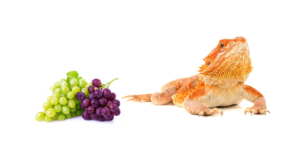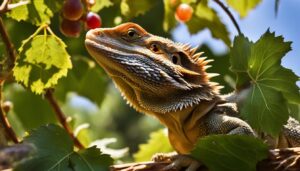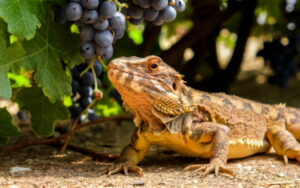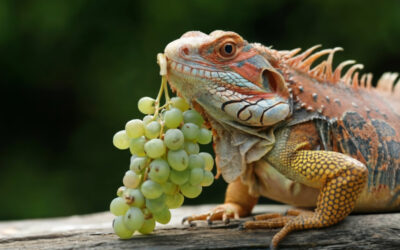Can bearded dragons eat grapes? This question often arises among pet owners seeking to provide the best nutrition for their scaly companions. Bearded dragons, known for their curious nature and varied diet, require a balanced intake of fruits and vegetables to thrive. Grapes, with their succulent sweetness and juicy appeal, may seem like a tempting treat.
However, the answer isn’t always straightforward. In this guide, we delve into the intricacies of incorporating grapes into your bearded dragon’s diet, exploring the benefits, risks, and considerations to ensure the health and well-being of your beloved reptile.
Can bearded dragons eat grapes?

Bearded dragons can indeed eat grapes, but it’s important to understand how to incorporate them into their diet safely. Grapes contain a lot of natural sugars, primarily fructose, which can be harmful to reptiles if consumed excessively. Therefore, grapes should only be offered occasionally and in moderation.
When feeding grapes to your bearded dragon, make sure to:
- Offer them as a treat: Grapes should not be a regular part of your bearded dragon’s diet. Instead, consider them as an occasional snack or treat.
- Feed them in moderation: Limit the number of grapes you offer at one time. One or two small grapes as a treat is usually sufficient.
- Remove seeds: Always remove any seeds from the grapes before feeding them to your bearded dragon. Seeds can pose a choking hazard and may also contain toxins.
- Wash thoroughly: Rinse the grapes thoroughly under running water to remove any pesticides or residues before offering them to your bearded dragon.
- Consider the age and health of your dragon: Young or small bearded dragons, as well as those with health issues such as diabetes, may be more sensitive to the sugars in grapes. Monitor their reaction and adjust accordingly.
Remember, while grapes can be a tasty treat for bearded dragons, their primary diet should consist of leafy greens, vegetables, and insects to ensure they receive the proper nutrition they need to thrive.
Grape suitability for bearded dragons
Grapes are not recommended as a regular part of a bearded dragon’s diet. While they are not toxic to bearded dragons in small amounts, they do contain a high amount of sugar, which can lead to digestive issues and obesity in reptiles if consumed in excess. Additionally, the skin of grapes can be difficult for bearded dragons to digest.
Bearded dragons primarily require a diet of insects, leafy greens, and some fruits as treats. These should be appropriately sized and offered in moderation to maintain a balanced diet and prevent health problems.
If you want to offer your bearded dragon fruits, it’s better to stick to options like berries, mangoes, or papayas, which are lower in sugar and have softer textures that are easier for them to digest. Always remember to remove any seeds or pits from fruits before feeding them to your bearded dragon, as these can be harmful.
Feeding Guidelines and Recommendations

While grapes are not a staple food for bearded dragons, they can be offered occasionally as a treat. Here are some guidelines and recommendations for feeding grapes to your bearded dragon:
- Moderation: Offer grapes as an occasional treat, rather than a regular part of your bearded dragon’s diet. Limit the frequency of grape consumption to once or twice a month.
- Size and Preparation: Choose seedless grapes and cut them into appropriately sized pieces for your bearded dragon to prevent choking hazards. Ensure that the grapes are thoroughly washed to remove any pesticides or residues.
- Small Portions: Bearded dragons have relatively small stomachs, so only offer a small piece of grape at a time. A single grape can be cut into smaller pieces or halves for easier consumption.
- Supervision: When offering grapes or any other treat, supervise your bearded dragon while they eat to ensure they are chewing and swallowing properly. Remove any uneaten portions promptly to prevent spoilage.
- Balanced Diet: Grapes should not replace the staple components of your bearded dragon’s diet, such as insects and leafy greens. Ensure they are receiving a varied and balanced diet to meet their nutritional needs.
- Monitor for Reactions: After offering grapes for the first time, observe your bearded dragon for any adverse reactions such as diarrhea, vomiting, or changes in behavior. If any negative symptoms occur, discontinue grape consumption and consult a veterinarian.
- Hydration: Grapes have a high water content, which can contribute to your bearded dragon’s hydration. However, always ensure that fresh water is available for them to drink.
Remember that every bearded dragon is different, and some may have sensitivities or allergies to certain foods. It’s essential to pay attention to your pet’s individual preferences and reactions when introducing new treats like grapes into their diet.
If you have any concerns or questions about your bearded dragon’s diet, consult with a reptile veterinarian for personalized advice.
Health benefits of grapes for bearded dragons
While grapes can be offered as an occasional treat for bearded dragons, they don’t offer significant health benefits compared to the staple components of their diet, such as insects and leafy greens. However, grapes do contain some nutrients that can contribute to your bearded dragon’s overall health when consumed in moderation:
- Hydration: Grapes have a high water content, which can help keep your bearded dragon hydrated, especially if they are reluctant to drink water from a dish.
- Antioxidants: Grapes contain antioxidants such as vitamin C and flavonoids, which can help protect cells from damage caused by free radicals. However, bearded dragons typically obtain sufficient antioxidants from their regular diet of leafy greens and other fruits and vegetables.
- Natural Sugars: While grapes contain natural sugars, they should be offered sparingly to avoid excessive sugar intake, which can lead to weight gain and other health issues.
- Variety: Offering a variety of fruits as treats, including grapes, can help provide enrichment and sensory stimulation for your bearded dragon.
Overall, while grapes can be a safe and occasional addition to your bearded dragon’s diet, they should not be relied upon for significant health benefits. It’s essential to prioritize a balanced diet consisting primarily of insects, leafy greens, and other appropriate foods to ensure your bearded dragon’s nutritional needs are met.
Risks and Considerations

When considering feeding grapes to your bearded dragon, it’s important to be aware of potential risks and considerations:
- High Sugar Content: Grapes contain natural sugars, which can lead to weight gain and other health issues if consumed in excess. Bearded dragons are not naturally adapted to metabolize large amounts of sugar, so offering grapes sparingly is essential to prevent obesity and related health problems.
- Choking Hazard: Bearded dragons may have difficulty swallowing large pieces of food, including grapes. Always cut grapes into appropriately sized pieces to minimize the risk of choking.
- Digestive Issues: The tough skin of grapes may be difficult for bearded dragons to digest, especially if they consume large quantities or have underlying digestive issues. Monitor your bearded dragon for any signs of gastrointestinal distress, such as bloating, diarrhea, or lethargy, after feeding grapes.
- Potential Pesticide Residues: Grapes are often treated with pesticides during cultivation, which can be harmful to bearded dragons if ingested. Wash grapes thoroughly before offering them to your pet, or consider purchasing organic grapes to minimize pesticide exposure.
- Individual Sensitivities: Like all foods, grapes may not agree with every bearded dragon. Some individuals may be more sensitive to certain fruits or develop allergic reactions. Monitor your pet closely after introducing grapes into their diet and discontinue feeding if any adverse reactions occur.
- Nutritional Balance: While grapes can provide some hydration and small amounts of nutrients, they should not replace the staple components of your bearded dragon’s diet, such as insects and leafy greens. Ensure that your pet receives a balanced diet that meets their specific nutritional requirements.
- Consultation with a Veterinarian: If you have any concerns about feeding grapes or other foods to your bearded dragon, consult with a reptile veterinarian for personalized advice. They can offer guidance on appropriate dietary choices and help address any health issues that may arise.
By being mindful of these risks and considerations, you can safely incorporate grapes into your bearded dragon’s diet as an occasional treat while ensuring their overall health and well-being.
Alternatives to grapes for a varied diet
Offering a varied diet is essential for the health and well-being of your bearded dragon. Here are some alternatives to grapes that you can incorporate to provide a diverse and nutritious diet:
- Leafy Greens: Leafy greens should make up a significant portion of your bearded dragon’s diet. Options such as collard greens, mustard greens, kale, dandelion greens, and turnip greens are excellent choices. These provide essential vitamins and minerals, along with fiber.
- Vegetables: Offer a variety of vegetables to supplement your bearded dragon’s diet. Suitable options include squash, bell peppers, carrots, zucchini, sweet potatoes, and cucumbers. Be sure to chop them into appropriately sized pieces for easy consumption.
- Insects: Insects are a crucial source of protein for bearded dragons. Offer a variety of insects, including crickets, dubia roaches, mealworms, superworms, and phoenix worms. Gut-load insects before feeding them to your pet to enhance their nutritional value.
- Fruits: While grapes should be given sparingly, there are other fruits that can be offered as occasional treats. These include berries (such as strawberries, blueberries, and raspberries), mangoes, papayas, apples (without seeds), and bananas. Remove any seeds or pits before feeding fruits to your bearded dragon.
- Calcium and Vitamin Supplements: Dusting insects with a calcium supplement and providing a multivitamin supplement can help ensure your bearded dragon receives all the necessary nutrients. Follow dosage recommendations provided by your veterinarian.
- Herbs: Some herbs can be offered to add variety to your bearded dragon’s diet. Suitable options include parsley, cilantro, basil, and mint. However, avoid feeding large quantities of herbs, as some may contain compounds that could be harmful in excess.
- Commercial Diets: Commercial diets formulated specifically for bearded dragons are available in pellet or powdered form. While these can be convenient, they should not be the sole source of nutrition and should be supplemented with fresh foods.
When planning your bearded dragon’s diet, aim for variety and balance to ensure they receive all the essential nutrients they need to thrive. Monitor their appetite, weight, and overall health to ensure they are maintaining optimal condition.
Conclusion
While bearded dragons can eat grapes, they should be offered in moderation due to their high sugar content and potential digestive issues. As grapes are not a part of their natural diet in the wild, it’s important to consider them as occasional treats rather than a primary food source.
Can bearded dragons eat grapes naturally is less likely, therefore, they should be provided sparingly and as part of a balanced diet that mimics their natural feeding habits as closely as possible. Always monitor your pet’s health and consult with a reptile veterinarian for proper dietary guidance.

